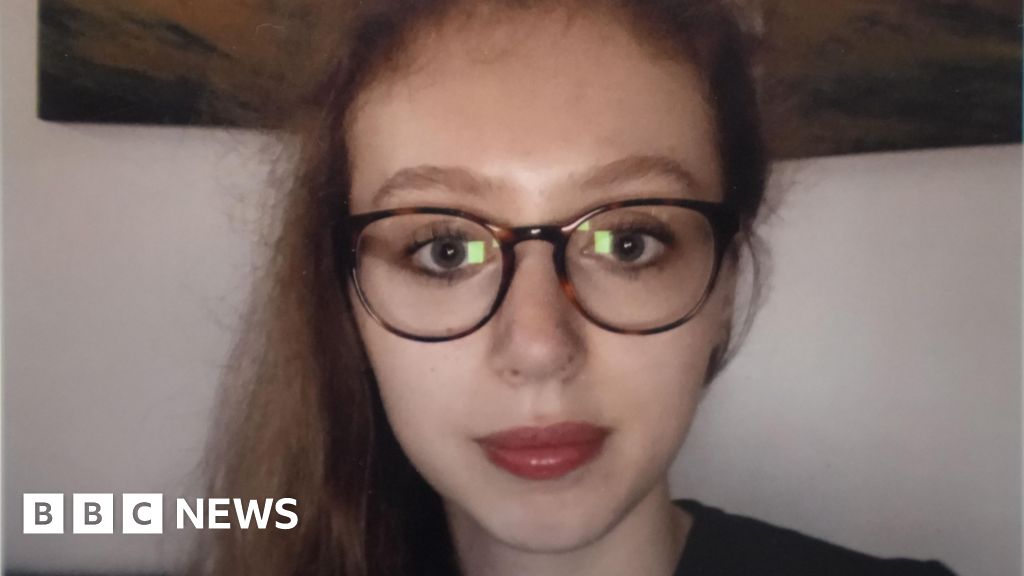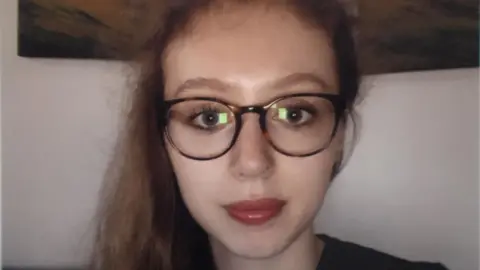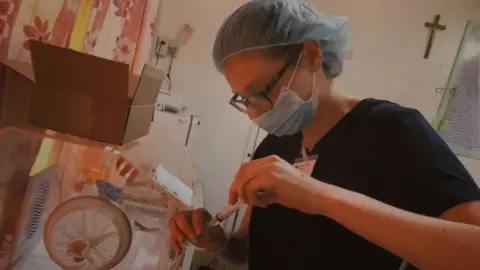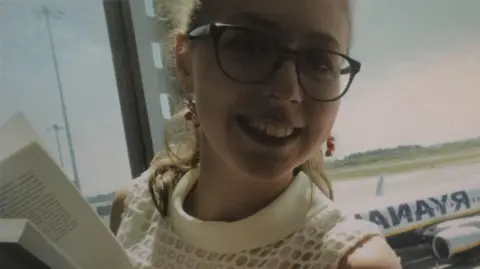
 Family photo
Family photoThe parents of a student who killed herself after receiving inaccurate exam results are calling for universities to provide better support.
Mared Foulkes, from Anglesey, received an email in July 2020 saying that she had failed an assessment and could not progress to her third year – even though she had already re-sat it and passed.
Cardiff University said it has already made changes to the way it operates.
But Mared’s family want to see a change in the law on how universities support students with mental health issues, and how they communicate with the families of students.
Mared Foulkes was 21, a talented and intelligent student from near Menai Bridge who had already dedicated her life to a career as a pharmacist, working in a chemist in Caernarfon, Gwynedd, to get experience.
But on 8 July 2020, she received an email from Cardiff University saying she had failed one of her assessments and implying that she could not go on to her third year.
The email did not mention that she had already re-sat the exam and passed it.
Mared’s mother, Iona Foulkes, said: “She came home that evening from work and we had a normal family meal.
“Then she decided she wanted to make a cheesecake and said she was going to the local supermarket and asked if I wanted anything.
“She took the car keys and left.”
But Mared would never return.
 Family photo
Family photoTwo police officers visited the house later that evening to tell her family that she had died.
Mrs Foulkes said: “Every aspect of our family life has been shattered. Our home is heavy with memories and our lives are changed forever.
“Passing by Mared’s empty bedroom is achingly hard.
“Each day takes is further from the last few hours we had with our beautiful and much-loved daughter, we have not ceased to grieve.”
 Family photo
Family photoHer parents later found out that Mared had messaged a friend to say “I did crap” during the day.
“She had worked so hard at her course,” her mother added.
“She had her heart set on becoming a pharmacist from a young age. She had done voluntary work in a hospital in the Philippines and been accepted to study in China.
“To be informed that you have failed two years of study and you couldn’t progress – it must have been horrific.
“You are talking about a 21-year-old, a young person getting this information.
“It is a tragedy which should never have happened. It shouldn’t be. Something needs to change – quickly – before more families have to endure what we have to live with for the rest of our lives.”
Mared’s parents are working with the families of other young people who have killed themselves to call for changes in the law about the way universities support students and their families.
They have started that process with a group of lawyers, who are writing a report which will recommend improvements in the way universities communicate with families.
 Family photo
Family photoNine months before Mared died, she had visited the university’s support services to discuss her mental health, but her family did not find out until a year after her death.
Mrs Foulkes said: “I fully understand that students are young adults, and some do not wish their parents or guardians to be informed what they do or what their exam results are.
“But there should be some way that they can inform parents if something does go wrong.”
A spokesperson for Cardiff University said that the way students get their results, and the information they receive has already been changed as a result of Mared’s death.
“We are determined to improve the tone and language of all our written communications to our students,” they said.
“We will make explicit reference to where students can access help and support if they are concerned about their results.”
However, the spokesperson added that discussing students’ mental health with parents was a difficult issue.
“Universities need to balance the legitimate needs of parents to be informed about their children while respecting the rights, privacy and wishes of adult students who may – for a variety of legitimate and complex reasons – not want their personal information to be shared with their parents,” they said.
“We have put a new system in place where we ask students to give us a trusted contact when they enrol. This is someone the university will contact if there are serious concerns about a student’s health or wellbeing.
“We know Mared Foulkes’ family feel we could have done things differently and we have apologised for where we did not get things right.
“The impact of Mared’s death and her parents’ wishes have informed and continue to inform and impact on our approach.”
If you’ve been affected by the issues in this story, help and support is available via the BBC Action Line.




